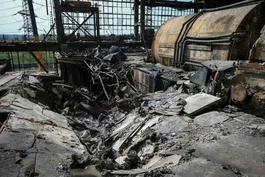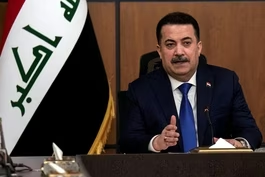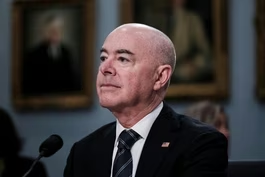
Columbia University president faces antisemitism committee
Clip: 4/17/2024 | 6m 1sVideo has Closed Captions
Columbia University president faces House committee investigating antisemitism on campus
When presidents of several top Ivy League schools testified about antisemitism on their campuses during a tough hearing this winter, the president of Columbia University was traveling. Wednesday, it was her turn to appear before a House Committee. She strongly denounced antisemitism and hate speech, but some members of the committee felt she had not done nearly enough. Laura Barrón-López reports.
Problems playing video? | Closed Captioning Feedback
Problems playing video? | Closed Captioning Feedback
Major corporate funding for the PBS News Hour is provided by BDO, BNSF, Consumer Cellular, American Cruise Lines, and Raymond James. Funding for the PBS NewsHour Weekend is provided by...

Columbia University president faces antisemitism committee
Clip: 4/17/2024 | 6m 1sVideo has Closed Captions
When presidents of several top Ivy League schools testified about antisemitism on their campuses during a tough hearing this winter, the president of Columbia University was traveling. Wednesday, it was her turn to appear before a House Committee. She strongly denounced antisemitism and hate speech, but some members of the committee felt she had not done nearly enough. Laura Barrón-López reports.
Problems playing video? | Closed Captioning Feedback
How to Watch PBS News Hour
PBS News Hour is available to stream on pbs.org and the free PBS App, available on iPhone, Apple TV, Android TV, Android smartphones, Amazon Fire TV, Amazon Fire Tablet, Roku, Samsung Smart TV, and Vizio.
Providing Support for PBS.org
Learn Moreabout PBS online sponsorshipGEOFF BENNETT: When presidents of several top Ivy League schools testified about antisemitism on their campuses during a tough House hearing this past winter, the president of Columbia University was traveling and did not attend.
Today, though, it was her turn to appear before the committee.
She strongly denounced antisemitism and hate speech.
But, as Laura Barron-Lopez reports, some members of the committee felt she had not done nearly enough.
MINOUCHE SHAFIK, President, Columbia University: Thank you, Madam Chairwoman.
LAURA BARRON-LOPEZ: From the outset, Columbia President Minouche Shafik tried to persuade lawmakers that the university is being more aggressive about combating antisemitism.
MINOUCHE SHAFIK: Columbia strives to be a community free of discrimination and hate in all its forms, and we condemn the antisemitism that is so pervasive today.
Antisemitism has no place on our campus, and I am personally committed to doing everything I can to confront it directly.
LAURA BARRON-LOPEZ: Shafik and other Columbia officials who testified before Congress, including the co-chairs of its board of trustees, said they were not yet satisfied with the situation on campus.
Shafik said the school has taken some action, suspending 15 students and disciplining a handful of professors.
But lawmakers, particularly Republicans, grilled Shafik on the university's response and whether it had adequately punished those who made antisemitic statements.
Virginia Foxx is the committee chair.
REP. VIRGINIA FOXX (R-NC): Well, how can we be confident that you will restore order and a safe learning environment if it took you months to send warning letters?
MINOUCHE SHAFIK: I have absolutely no hesitation in enforcing our policies.
When I first started at Columbia, our policies, our systems and our enforcement mechanisms were not up to the scale of this challenge.
REP. VIRGINIA FOXX: OK. MINOUCHE SHAFIK: They were designed for a very different world.
LAURA BARRON-LOPEZ: Lawmakers focused much of their questioning on the employment of a tenured professor in the Department of Middle Eastern, South Asian and African Studies, Joseph Massad.
Massad first came under fire after publishing an article on October 8 in which he described scenes of Hamas' attack as -- quote -- "awesome and astonishing," which were seen by many as glorifying violence.
He told The New York Times today that his article was being distorted.
He was also one of several faculty who participated in an unauthorized April 4 protest on campus that was in support of Gaza.
Tim Walberg is a Republican member from Michigan.
REP. TIM WALBERG (R-MI): Do you stand behind Professor Massad remaining chair of the Academic Review Committee, given his support for terrorism and harassing Jewish students?
MINOUCHE SHAFIK: Congressman Walberg, I just want to confirm that when faculty behave in any discriminatory fashion at Columbia, there are consequences.
REP. TIM WALBERG: You talked to him.
MINOUCHE SHAFIK: No, we take them out of the classroom if necessary.
REP. TIM WALBERG: Is he out of the classroom?
MINOUCHE SHAFIK: I believe, to answer your question, he is no longer a chair of that committee and does not have a leadership role.
LAURA BARRON-LOPEZ: But as the hearing continued, Shafik said she wasn't sure of that.
Finally, after repeated questioning, she seemed to commit to removing Massad as chair of an academic review committee.
Shafik also said several faculty were removed from the classroom and confirmed one professor was fired for allegedly posting support for Hamas.
Others focused their questioning on the Jewish student experience, including Republican lawmaker Clarence Burgess Owens.
REP. BURGESS OWENS (R-UT): There's a statement from a student -- of a Jewish student at Columbia: "It's impossible to exist as a Jewish student at Columbia without running face first into antisemitism every single day.
Jew hatred is so deeply embedded into the campus culture, it's become casual among students, faculty, and neglected by administrators."
Do you agree with this statement?
MINOUCHE SHAFIK: I have met those students and heard those words in the listening sessions that I have been holding.
I believe in leadership by presence and walking around, and I have listened to those students and it has distressed me hugely.
LAURA BARRON-LOPEZ: The grilling echoed a hearing held by the same committee in December, where the presidents of Harvard, the University of Pennsylvania, and the Massachusetts Institute of Technology were heavily criticized for their answers on questions about genocide.
Since then, both Harvard's president, Claudine Gay, and Penn's president, Elizabeth Magill, have resigned.
On Columbia's campus in particular, allegations include the beating of an Israeli student with a stick by a former undergraduate who was seen ripping down posters of Israeli hostages, and multiple students reported being cursed at for being Jewish.
Columbia cracked down on demonstrations, deferring to a newly created Task Force on Antisemitism.
David Schizer, co-chair of that task force, appeared before the committee today.
DAVID SCHIZER, Co-Chair, Columbia University Task Force on Antisemitism: The problem is there and it is not yet fixed.
And I will say that our first step was to look at rules for protests, and I am very grateful that our responses have been taken so seriously.
And, as I said, the university is implementing all of our recommendations, but we're only just getting started.
LAURA BARRON-LOPEZ: Pro-Palestinian students at Columbia have also been targeted, including a doxxing campaign where their identities were published online and circulated on a truck around campus.
Students for Justice in Palestine, the most prominent nationwide pro-Palestinian campus group, has been suspended from at least four universities, including Columbia, Brandeis, George Washington, and Rutgers.
Other campuses are also still reeling from the fallout from the overseas conflict.
This week, the University of Southern California canceled a planned graduation speech from a valedictorian, saying it was due to safety concerns.
The backlash was immediate, with some claiming her pro-Palestinian social media postings were the reason for the cancellation.
The House committee is planning to hold a similar hearing next month, this time calling forth public school administrators from California, New York, and Maryland.
REP. VIRGINIA FOXX: The committee stands adjourned.
LAURA BARRON-LOPEZ: For the "PBS NewsHour," I'm Laura Barron-Lopez.
Boeing whistleblowers testify about company's safety issues
Video has Closed Captions
Clip: 4/17/2024 | 4m 48s | Boeing whistleblowers testify about company's safety issues and design errors (4m 48s)
How Kharkiv is coping after 2 years of Russian strikes
Video has Closed Captions
Clip: 4/17/2024 | 4m 51s | How Kharkiv is coping after 2 years of war and constant Russian strikes (4m 51s)
Iraqi PM on regional turmoil, partnership with U.S.
Video has Closed Captions
Clip: 4/17/2024 | 14m 11s | Iraqi PM discusses regional turmoil and his country's partnership with the U.S. (14m 11s)
Middle East experts on Israel's response to Iran's attack
Video has Closed Captions
Clip: 4/17/2024 | 8m 47s | How will Israel respond to Iran's drone attack? Middle East experts offer views (8m 47s)
Senate dismisses impeachment articles against Mayorkas
Video has Closed Captions
Clip: 4/17/2024 | 6m 49s | Senate dismisses impeachment articles against DHS Secretary Mayorkas before trial begins (6m 49s)
Providing Support for PBS.org
Learn Moreabout PBS online sponsorship
- News and Public Affairs

FRONTLINE is investigative journalism that questions, explains and changes our world.

- News and Public Affairs

Amanpour and Company features conversations with leaders and decision makers.












Support for PBS provided by:
Major corporate funding for the PBS News Hour is provided by BDO, BNSF, Consumer Cellular, American Cruise Lines, and Raymond James. Funding for the PBS NewsHour Weekend is provided by...





